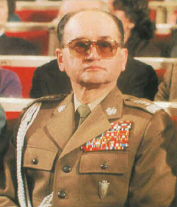| Poland Table of Contents
Martial LawIn December 1981, Wojciech Jaruzelski suddenly declared martial law, ordering the army and special police units to seize control of the country, apprehend Solidarity's leaders, and prevent all further union activity. In effect, Jaruzelski executed a carefully planned and efficient military coup on behalf of the beleaguered and paralyzed the PZPR. The motives of this act remain unclear. The general later claimed that he acted to head off the greater evil of an imminent Soviet invasion; detractors dismissed this explanation as a pretext for an ironfisted attempt to salvage party rule. In any case, the junta suppressed resistance with a determination that cost the lives of several protesters, and by the new year the stunned nation was again under the firm grip of a conventional communist regime. Under martial law, Jaruzelski's regime applied draconian restrictions on civil liberties, closed the universities, and imprisoned thousands of Solidarity activists, including Walesa. During the succeeding months, the government undid much of Solidarity's work and finally dissolved the union itself. Official pressure overcame repeated attempts by Solidarity sympathizers to force the nullification of the December coup. By the end of 1982, the junta felt sufficiently secure to free Walesa, whom it now characterized as the "former leader of a former union." After gradually easing the most onerous features of the state of emergency, Warsaw lifted martial law in July 1983, but Jaruzelski and his generals continued to control the most critical party and government posts. Poland at an ImpasseFrom the viewpoint of the regime, implementing martial law efficiently extinguished the immediate challenge posed by Solidarity. It did nothing, however, to resolve the long-standing crisis of "People's Poland," which in many ways originated in the very foundation of communist rule and the shadow of illegitimacy and ineptitude from which it never escaped. Jaruzelski presented himself as a realistic moderate, a proponent of reform who nevertheless insisted on the leading role of the party. Polish society remained sullenly unresponsive to his appeals, however. At the same time, he encountered resistance from the PZPR conservatives. These so-called hardheads, held in contempt by the public, regarded the party chief as too conciliatory and resented the interference of Jaruzelski's fellow generals in the affairs of the civilian party apparatus. Time proved that Jaruzelski's coup had staggered Solidarity but not killed it. Adherents of the union operated underground or from jail cells, advocating a waiting game to preserve the principles of the Gdansk Agreement. Walesa in particular refused to fade into obscurity; he gained added luster by his receipt of the Nobel Prize for Peace in 1983. In the next year, the Jaruzelski government suffered embarrassment when secret policemen were discovered to have abducted and murdered Father Jerzy Popieluszko, a priest who had gained recognition as the spiritual adviser of the repressed Solidarity. At that juncture, Poland seemed mired in frustrating deadlock, with no reasonable prospect of resuscitating the stricken economy or achieving political harmony. Collapse of the Communist RegimeThe deadlock was broken chiefly by events elsewhere in the Soviet alliance. The birth of Solidarity proved to be a precursor of forces of change across all of Eastern Europe and the Soviet Union. Once again Poland was in the midst of cataclysmic European events, but in this case Poland had a decisive influence on events in neighboring countries. Beginning with the liberalization programs of Mikhail S. Gorbachev in the Soviet Union and continuing with the unforeseen and sudden demise of Poland's communist regime, decades of tension had been released throughout the region by the end of 1989. Toward the Round-Table TalksThe first break in the Polish logjam occurred in 1985 when Gorbachev assumed leadership of the Soviet Union. Although Gorbachev in no way willed the demolition of the communist order in Poland and elsewhere in Eastern Europe, his policies of glasnost' and perestroika inadvertently accelerated the indigenous systemic rot in those countries. As the literal and figurative bankruptcy of East European communism became obvious, apologists resorted more frequently to the Brezhnev Doctrine--the understanding that Moscow would use force to prevent ceding any territory once under its control--as the ultimate justification of the status quo. But the sustained liberalism of the Gorbachev era undermined the credibility of this last-ditch argument. The inhibiting fear of Red Army retaliation, which had blocked reform in Poland and elsewhere in earlier years, gradually faded. Hastening to identify itself with Gorbachev, the Jaruzelski team welcomed the spirit of reform wafting from the east and cautiously followed suit at home. By 1988 most political prisoners had been released, unofficial opposition groups were flourishing, and Solidarity, still nominally illegal, operated quite openly. In the meantime, however, economic malaise and runaway inflation had depressed Polish living standards and deepened the anger and frustration of society. In early 1988, strikes again were called in Gdansk and elsewhere, and a new generation of alienated workers called for representation by Solidarity and Walesa. Amid widespread predictions of a social explosion, Jaruzelski took the momentous step of beginning round table talks with the banned trade union and other opposition groups. This measure was taken over the objections of the still-formidable hard-line faction of the PZPR. 
Custom Search
Source: U.S. Library of Congress |
 The Jaruzelski regime marked another historic turning point in
governance of the Polish state. Beginning with repressive measures to
silence all opposition, Jaruzelski eventually presided over the popular
rejection of Polish communism.
The Jaruzelski regime marked another historic turning point in
governance of the Polish state. Beginning with repressive measures to
silence all opposition, Jaruzelski eventually presided over the popular
rejection of Polish communism.